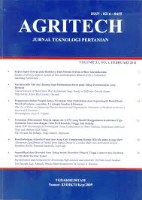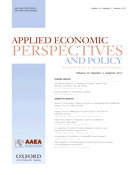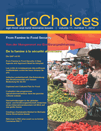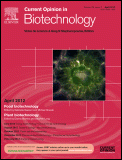
Bio-based and Applied Economics
Scope & Guideline
Exploring the Intersection of Economics and Environmental Stewardship
Introduction
Aims and Scopes
- Sustainable Agricultural Economics:
Research that examines the economic aspects of sustainable agricultural practices, including the adoption of innovative farming techniques and the impact of agricultural policies on sustainability. - Bioeconomy and Resource Management:
Studies focusing on the bioeconomy, which integrates biological resources into economic processes, emphasizing the importance of natural resource management and the role of agriculture in economic development. - Policy Analysis and Evaluation:
In-depth evaluations of agricultural policies, their effectiveness, and implications for rural development and environmental sustainability, often using case studies and comparative analyses. - Market Dynamics and Consumer Behavior:
Analysis of market trends, consumer preferences, and the economic implications of food systems, including the effects of climate change and global market fluctuations on agricultural productivity. - Interdisciplinary Approaches:
Utilization of various methodologies, including qualitative and quantitative analyses, to address complex issues in agriculture and economics, often incorporating insights from environmental science, sociology, and policy studies.
Trending and Emerging
- Climate Change Adaptation Strategies:
An increasing focus on how agricultural systems can adapt to climate change, including studies on resilience, vulnerability, and the economic implications of climate-related policies. - Agri-environmental Public Goods:
Growing research on the provision and acceptance of public goods from agriculture, highlighting the importance of environmental services and sustainable practices in policy frameworks. - Innovative Contract Solutions:
Emerging interest in innovative contractual arrangements for farmers to promote environmentally friendly practices, suggesting a shift towards more collaborative and participatory approaches in agricultural economics. - Bioeconomy Resilience and Economic Shocks:
Recent papers emphasize the resilience of the bioeconomy during economic shocks, particularly in the context of the COVID-19 pandemic, revealing insights into the robustness of food systems. - Stakeholder Engagement and Knowledge Systems:
A trend towards incorporating stakeholder perspectives and expert knowledge in agricultural decision-making processes, emphasizing the role of local actors in implementing sustainable practices.
Declining or Waning
- Traditional Agricultural Practices:
Research related to conventional farming methods is becoming less prevalent as the focus shifts towards sustainable and innovative practices that align with environmental objectives. - Generalized Economic Models:
There is a noticeable decrease in papers using broad economic models without specific application to bioeconomy or sustainability, as the journal increasingly favors targeted, context-specific studies. - Impact of Global Supply Chains:
While previously a significant theme, the impact of global supply chains on local agriculture is receiving less attention, possibly due to a growing focus on local and sustainable food systems. - Historical Agricultural Policy Analysis:
Studies focused solely on historical agricultural policies without current relevance are diminishing, reflecting a shift towards contemporary policy implications and future-oriented research. - Single-discipline Approaches:
Research that does not integrate interdisciplinary perspectives is waning, as the journal encourages comprehensive approaches that combine economics with environmental and social dimensions.
Similar Journals

JOURNAL OF AGRICULTURAL AND RESOURCE ECONOMICS
Fostering impactful research for a sustainable future.Journal of Agricultural and Resource Economics is a pivotal platform in the realm of agricultural and resource economics, published by the Western Agricultural Economics Association. Since its inception, the journal has embraced an Open Access model, fostering widespread dissemination of research findings to benefit both scholars and practitioners in the field. The journal operates within an impressive global ranking framework, resting in Q2 across several pertinent categories including Agronomy and Crop Science, Animal Science and Zoology, and Economics and Econometrics. With its ISSN 1068-5502 and E-ISSN 2327-8285, it has garnered attention for its rigorous academic standards and impactful contributions to the discourse on resource management and agricultural practices. Researchers, professionals, and students alike will find the journal's ongoing commitment to advancing knowledge invaluable, with publications that span from 1996 to 2024 capturing evolving trends and insights in the sector.

Agritech
Innovating the Future of Farming Through TechnologyAgritech is a prominent open-access journal dedicated to advancing the field of agricultural technology. Published by UNIV GADJAH MADA, FAC AGRICULTURAL TECHNOLOGY, this esteemed journal disseminates innovative research and cutting-edge practices that contribute significantly to sustainable agriculture, precision farming, and environmental stewardship. Launched in 1999, Agritech has established itself as a vital resource for researchers, professionals, and students alike, providing a platform for the exchange of ideas and findings that shape the future of agricultural technology. By embracing an open-access model, the journal ensures that high-quality research is accessible to a global audience, promoting collaboration and knowledge sharing in the agricultural community. With an ISSN of 0216-0455 and an E-ISSN of 2527-3825, Agritech remains committed to enriching agricultural practices and policies through rigorous scientific inquiry and innovation.

New Medit
Exploring innovative solutions to pressing global challenges.New Medit is a distinguished open-access journal published by Bologna University Press, focusing on the diverse realms of agricultural, biological, and social sciences. Established in 1990, New Medit aims to foster interdisciplinary research and dialogue, facilitating knowledge exchange among academics, policymakers, and practitioners. With a notable impact factor and recognized quartile rankings, including Q2 in Agricultural and Biological Sciences and Q3 in various other categories such as Agronomy, Development, and Economics, the journal maintains a steady trajectory of scholarly excellence. Its commitment to accessibility ensures that valuable research is available to a wide audience, thereby contributing significantly to advancements in these critical fields. With its publication history converging from 2008 to 2024, New Medit continues to be a crucial platform for innovative research and comprehensive reviews that address pressing global challenges.

German Journal of Agricultural Economics
Navigating the Future of Agriculture through Economic InsightThe German Journal of Agricultural Economics, published by the esteemed DEUTSCHER FACHVERLAG GMBH, serves as a pivotal platform for the dissemination of research in the fields of Agricultural and Biological Sciences as well as Economics and Econometrics. Situated in Germany, this journal, with ISSN 0515-6866 and E-ISSN 2191-4028, has established a notable presence, reflected in its 2023 category quartiles—ranking Q2 in Agricultural and Biological Sciences (miscellaneous) and Q3 in Economics and Econometrics. With a converged publication timeline from 2011 to 2024, it aims to foster dialogue and research innovation related to agricultural economics, with an emphasis on contemporary challenges and advancements in the sector. The journal seeks to cater to a diverse audience, including researchers, professionals, and students, by providing access to high-quality, peer-reviewed articles that contribute to the ongoing discourse in these critical areas of study. Whether you are looking to keep abreast of the latest findings or seeking publishing opportunities, the German Journal of Agricultural Economics is an essential resource for anyone engaged in agricultural and economic research.

Applied Economic Perspectives and Policy
Exploring Innovative Pathways in EconomicsApplied Economic Perspectives and Policy is a leading journal published by WILEY, focusing on contemporary issues in economics and development policy. With its commitment to advancing knowledge in these critical fields, the journal boasts an impressive impact factor and consistently ranks in the top quartiles, being categorized as Q1 in both Development and Economics & Econometrics as of 2023. Its Scopus rankings reflect this excellence, placing it at #15 out of 306 in Social Sciences Development and #45 out of 716 in Economics and Econometrics, indicating a prestigious standing within the academic community (95th and 93rd percentiles, respectively). The journal is dedicated to publishing high-quality research that informs policy-making and fosters economic development, inviting submissions that explore innovative solutions to pressing global challenges. As an open-access journal, it ensures widespread visibility and accessibility, encouraging researchers, professionals, and students to engage with the latest findings and contribute to meaningful discussions in the field. With a converged presence from 2010 to 2024, it serves as a vital resource for those looking to stay at the forefront of economic research and policy analysis.

African Journal of Agricultural and Resource Economics-AFJARE
Exploring innovative solutions for Africa's agricultural challenges.African Journal of Agricultural and Resource Economics (AFJARE) is a dynamic publication dedicated to advancing the fields of agricultural and resource economics within the context of Africa. Published by the African Association of Agricultural Economists, this journal serves as a vital platform for researchers, professionals, and students to disseminate their findings and engage with contemporary issues affecting the agricultural sector across the continent. With an ISSN of 1993-3738 and an E-ISSN of 1993-3738, AFJARE aims to reach a wide audience through its commitment to open access, ensuring that crucial research is accessible to all. The journal has recently established itself in the academic landscape, achieving a Q3 ranking in Agricultural and Biological Sciences and a Q4 ranking in Economics and Econometrics for 2023. Covering a diverse scope from 2018 to 2023, AFJARE encourages submissions that explore innovative economic strategies and policies that can foster agricultural development and resource management in Africa. With its growing impact and relevance, AFJARE is poised to become a cornerstone in the discourse on agricultural economics in Africa and beyond.

EuroChoices
Illuminating contemporary issues through rigorous research.EuroChoices, published by WILEY, is a leading journal in the fields of economics and geography, demonstrating a significant impact as evidenced by its exceptional rankings—Q1 in both Economics, Econometrics and Finance and Geography, Planning and Development for 2023. With an ISSN of 1478-0917 and an E-ISSN of 1746-692X, this esteemed journal has been a pivotal platform for scholarly discourse since its inception in 2003, evolving thoughtfully to encompass contemporary issues and trends through 2024. Situated in the United States, it serves as an essential resource for researchers, professionals, and students alike, offering insights that bridge economic theories with geographical perspectives. While it maintains a traditional publishing approach without open access options, the journal continues to thrive, achieving high ranks in Scopus—with Economics positioned 37th out of 242 and Geography at 151st out of 821—highlighting its role as a critical contributor to the academic community.

Scientific Papers-Series Management Economic Engineering in Agriculture and Rural Development
Elevating Agricultural Practices with Cutting-edge ResearchScientific Papers-Series Management Economic Engineering in Agriculture and Rural Development is a premier open access journal dedicated to advancing the field of agricultural and rural development management. Published by the University of Agronomic Sciences and Veterinary Medicine Bucharest, this journal has been a valuable resource for researchers, practitioners, and students since its inception in 2009. With a focus on the integration of economic engineering principles into agricultural practices, the journal aims to provide innovative solutions and insights that address contemporary challenges in rural development. While the journal's H-index and specific Scopus rankings are not listed, its open access format ensures that cutting-edge research is readily available to a global audience, facilitating engagement and collaboration across disciplines. Located in the heart of Romania, the journal serves as a critical platform for disseminating impactful research and fostering dialogue in the ever-evolving landscape of agriculture and rural development.

Studies in Agricultural Economics
Cultivating Interdisciplinary Approaches to Economic IssuesStudies in Agricultural Economics is a premier journal published by AGRARGAZDASAGI KUTATO & INFORMATIKAI INTEZET in Hungary, focusing on innovative research in the interdisciplinary fields of agricultural, biological, and economic sciences. Since becoming an Open Access journal in 1997, it has aimed to enhance the visibility of agricultural economics scholarship while promoting global engagement among researchers, practitioners, and policymakers. With its robust Q2 and Q3 rankings across varied categories including Development and Geography, this journal serves as a significant platform for disseminating cutting-edge studies that address crucial issues in agriculture and rural development. The journal's continuous publication since 2011 until 2024 exemplifies its commitment to providing timely insights into evolving agricultural challenges. With a strong Scopus ranking across multiple domains, particularly in the social sciences and agricultural sectors, it stands as a vital resource for anyone looking to advance knowledge and practice in these critical areas.

CURRENT OPINION IN BIOTECHNOLOGY
Elevating Perspectives in Biotechnology and BeyondCurrent Opinion in Biotechnology, published by Elsevier Science Ltd, is a premier academic journal dedicated to providing critical insights and evaluations on emerging trends and developments in the ever-evolving fields of biotechnology and bioengineering. With an impressive impact factor and ranking in the Q1 quartile across bioengineering, biomedical engineering, and biotechnology, this journal serves as an indispensable resource for researchers, professionals, and students alike. Spanning from 1990 to 2024, the journal facilitates scholarly discourse by featuring concise reviews authored by leading experts, covering cutting-edge topics and innovative technologies. With a strong presence in renowned databases such as Scopus, where it ranks within the top percentiles in multiple categories, Current Opinion in Biotechnology not only contributes to the academic community but also impacts industry practices, making it a highly relevant platform for those looking to stay at the forefront of biotechnology innovation.